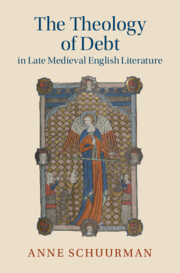Book contents
- The Theology of Debt in Late Medieval English Literature
- Cambridge Studies in Medieval Literature
- The Theology of Debt in Late Medieval English Literature
- Copyright page
- Dedication
- Contents
- Acknowledgements
- Abbreviations
- Introduction
- Chapter 1 Counterfeit Money
- Chapter 2 Secret Debts
- Chapter 3 Home Economics
- Chapter 4 “What is ynogh to mene”
- Chapter 5 Piers Plowman and the Inappropriable
- Epilogue
- Notes
- Bibliography
- Index
- Cambridge Studies in Medieval Literature
Chapter 5 - Piers Plowman and the Inappropriable
Published online by Cambridge University Press: 04 January 2024
- The Theology of Debt in Late Medieval English Literature
- Cambridge Studies in Medieval Literature
- The Theology of Debt in Late Medieval English Literature
- Copyright page
- Dedication
- Contents
- Acknowledgements
- Abbreviations
- Introduction
- Chapter 1 Counterfeit Money
- Chapter 2 Secret Debts
- Chapter 3 Home Economics
- Chapter 4 “What is ynogh to mene”
- Chapter 5 Piers Plowman and the Inappropriable
- Epilogue
- Notes
- Bibliography
- Index
- Cambridge Studies in Medieval Literature
Summary
Chapter 5 considers the ways in which Piers Plowman attempts to translate a Franciscan form-of-life into vernacular, worldly terms. While the Franciscan forma vitae details the way of living for each brother, from his clothing to his daily activities to the correction of his faults, Piers Plowman details the means of making a living in an inappropriable world. I argue that the poem asks these questions by way of its sustained meditation on the meaning and nature of labour as the continual payment of an unpayable debt. Langland explores the value and meaning of labour most explicitly in and through the three figures in the poem who are most closely linked with Franciscanism, and who court most dangerously the charges of idleness and default: Rechelesnesse, Nede, and the Dreamer himself. As this chapter shows, the irreducibly ambiguous nature of these three figures, who mix truth with half-truth and misunderstanding, who aspire to the ideals taught by Holy Church, Patience, Kynde, and Conscience, but who embody an all-too-human failure to attain them, encapsulates the poem’s interpretive inappropriability.
Keywords
- Type
- Chapter
- Information
- The Theology of Debt in Late Medieval English Literature , pp. 136 - 171Publisher: Cambridge University PressPrint publication year: 2024

